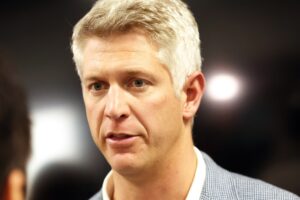
CHICAGO—Here are excerpts from Orioles executive vice president/general manager Mike Elias’ post-trade deadline video conference call on Friday:
Is Elias happy with the team’s development of pitching?
“We haven’t brought in a lot of real, real high draft picks on the pitching side. A little more recently, but early in the rebuild we wanted and needed to hit on those picks with core position players, and so that was our emphasis. I think that our pitching department has done a great job with a lot of lower investment-type guys that we’ve brought in and they’ve been able to demonstrate a lot of the skill that we’ve had on the pitching side with how they’ve coached up some of these players.
“A lot of them are still in the farm system, but you’re going to see them soon. We’ve had a lot of injury misfortune, as have other organizations. It’s a really tough thing right now to get pitching figured out all around. But this is an area that there’s always room for improvement, and we definitely need better pitching performance on the field in 2026, and so we’re going to be pushing for that.”
Does Elias think the Orioles are in better position to make trades for the major league roster?
“Yeah, I think that we kind of, maybe quietly, we pushed a lot of chips in in 2024 in particular, in that we traded a lot of players away. And we had a playoff season, but we didn’t have a long playoff run, as we all know. And it depleted a lot of the farm system, and it is important to have that ability to make trades when you want to. Our farm system is a lot richer and a lot more robust than it was one month ago, and that’s going to help us.”
How aggressive does the front office need to be?
“I don’t like saying aggressive or not aggressive. We want to be good, we want to be smart, we want to have it be effective. Signing Ramón Laureano was probably not an aggressive move but it paid great dividends, and so you’re trying to get good results. It’s not easy; that’s why there’s so much fierce competition among 30 teams. That’s what this is all about is watching these baseball players and these baseball organizations compete against each other. We want to be good, we want to be effective, we want to be smart. That’s where our focus is on.”
How much have you thought about the managerial position and the job Tony Mansolino is doing?
“Quite a bit of thought. Tony continues to do a great job keeping the team on track, and we’ve seen improvement and we’ve really liked what he’s done in the spirit of the team under his helm, but I’m, with the deadline and the draft over, turning over my focus to setting up the organization for 2026 and that includes thinking about that position.”
Where there any opportunities to add a meaningful starter or reliever for next season?
“Yeah, we definitely tried for that. It’s a rental reliever, a rental player, and I say, ‘Hey, give me your major league ready starting pitcher that’s under control for six years,’ it’s just not a real likely trade to happen in that context. So rather than try to force that and either come away with nothing or come away with a guy that’s not very good, I think the right thing to do is get the most value back for the organization, and so that’s what we did.
“But obviously, we would have loved to do that, but you’ve got to be realistic and there’s just not a lot of major league ready starting pitchers being traded by teams that are right there in contention, especially for rental-type returns.”
Is the organization going to spend enough money to compete?
“First of all, we did spend money in a lot of these trades and I want to thank and credit [owner David Rubenstein] and our ownership group for making that lever available to facilitate better talent returns. Often times, especially nowadays, the teams on the buy side of these trades, they’re in the [Competitive Balance Tax] space, so they’re paying luxury taxes, they’re giving up draft picks when they take on payroll, so it’s really important for them sometimes to get some financial help, and you’ve got to have owners who are able and willing to do that in order to participate.
“So I think that was very helpful in us being able to execute an effective sell deadline, and I think that speaks to their ability and willingness to invest not just in the team and the payroll but in the organization. They really want to win; they’re disappointed with how this went. And we’re going to get back in the saddle.”
Are you more optimistic about the Orioles’ chances than you were before the deadline?
“I am, because we just brought a lot of talent into this system. You never know how the deadline’s going to go. You can have bad luck at the deadline and deals can fall through and you can end up not doing what you need to do or want to do, and by and large that didn’t happen.
“We feel good with how the chips fell and the talent that we brought in. It’s going to help us in any number of ways. This isn’t what we wanted to be six months ago, but we’re in a much better spot than we were one month ago and our core players are rolling a little bit and getting healthy and as you mentioned, [Samuel] Basallo and [Dylan] Beavers are getting close and other guys, so there’s bright stuff ahead. We hope that this misfortune passes and we get back to where we expect and need to be going forward.”
Call for questions: I answer Orioles questions most weekdays. Please send yours to: Rich@BaltimoreBaseball.com
